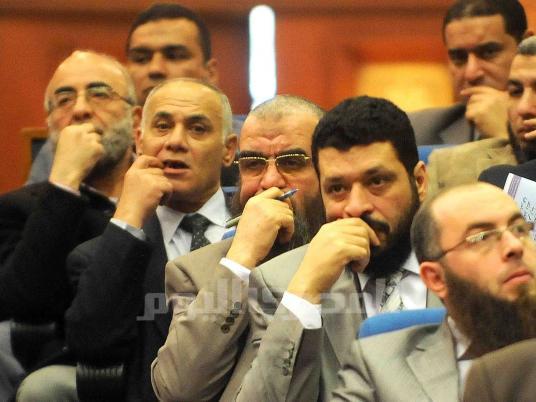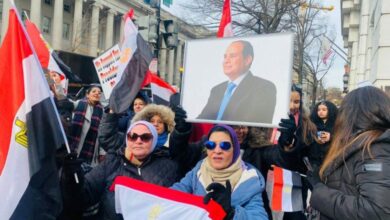
Egypt’s newspapers on Wednesday focus their coverage on a multitude of controversies surrounding the People’s Assembly and its draft laws, along with intensely heated presidential campaigning, Egyptians voting from embassies abroad and other news.
A host of newspaper articles criticize Parliament’s performance over its issuing controversial draft laws. The top headlines in the independent Al-Dostour newspaper ask the following questions: “Will the Egyptian state collapse only to be replaced by a state run by the Society of Muslim Brethren?” The paper ponders the possibility of the Muslim Brotherhood’s control over media and TV, along with its interference in the independent affairs of Egypt’s judiciary. “Will the psychopathic state replace the Egyptian state?” the paper asks.
Al-Dostour runs a headline quoting Judge Hatem Bagato of the Supreme Constitutional Court. “Bagato: Fearing the dissolution of Parliament, the People’s Assembly tailors laws to service its interests.” Bagato argues that the Islamist-dominated Parliament is directly interfering in the affairs and independence of the judiciary using draft laws. Bagato says the court rejects any draft law from Parliament that aims to restructure it, deeming such actions unconstitutional.
“People’s Assembly plans a judicial massacre,” a headline in the liberal newspaper Al-Wafd reads. The accompanying article mentions the opinion of the Supreme Constitutional Court’s general assembly that Parliament, led by the Muslim Brotherhood, is seeking to bypass its potential dissolution by issuing a draft law that would manipulate the court’s judges.
The Tagammu Party paper Al-Ahaly runs the headline “Supreme Constitutional Court accuses People’s Assembly of attempting to terrorize its judges.” Quoting a judicial source, Al-Ahaly says Parliament’s draft law stipulates that the court has the right to review legislation it issues, except when the legislation is issued by a 75 percent majority of votes. If three-fourths of the People’s Assembly votes for a law, then the court cannot rule against it — an act that would “deprive the court of its specializations and right to judicial oversight,” the paper says.
Al-Watan, an independent paper, says the People’s Assembly is fighting for its own interests at the expense of the court, while still struggling to remove the Cabinet of Prime Minister Kamal al-Ganzouri and to form its own Islamist-dominated Parliament — all while Parliament continues to work on a draft law that would regulate the Constituent Assembly, which it had previously tried to dominate until its actions were ruled unconstitutional. “Parliament fights on all fronts,” the headline reads.
Al-Gomhurriya runs the headline “Important popular causes being discussed in Parliament.” The state-owned paper focuses its coverage on the debates and draft laws pertaining to subsidized low-income housing units, and the prohibition of monopolizing building and construction materials, along with the standards for reconciliation agreements with businessmen accused of stealing or appropriating state lands or public resources during ousted President Hosni Mubarak’s rule.
Independent newspaper Al-Shorouk writes that the president of the republic would no longer hold the post of police commander-in-chief, “by the will of the People’s Assembly.” The article says liberal MP Amr Hamzawy submitted a draft law that would strip the new president of that duty. However, other MPs have expressed their reservations regarding such a law, given that it may be ruled unconstitutional because the president has legally and historically been the de facto and de jure chief of the police and armed forces.
Al-Gomhurriya also provides in-depth coverage of the heated presidential campaigns, yet its coverage focuses almost exclusively on four top hopefuls — former Mubarak-era Foreign Minister Amr Moussa, former Muslim Brotherhood member Abdel Moneim Abouel Fotouh, Brotherhood candidate Mohamed Morsy and Nasserist Karama Party leader Hamdeen Sabbahi.
Al-Gomhurriya quotes Moussa as claiming, “I’m not being backed or financial supported by Qatar,” while Abouel Fotouh says, “I’m an independent candidate, and I’m no longer a member of the Brotherhood, as I’ve resigned.” Morsy argues, “We don’t like to clash with others or accuse them of treachery.” Finally, Sabbahi pledges “to establish 240 villages around the fresh waters of Lake Nasser” as part of his campaign.
Al-Ahaly attempts to shine up the image of the Tagammu Party presidential candidate, retired Judge Hesham al-Bastawisi. Bastawisi, an underdog in the election, says his campaign generally revolves around “independent national development, social justice, political democracy based on popular participation, and a culture of progressive, democratic politics.”
As for the Brotherhood’s party paper, Freedom and Justice’s headlines make it seem that Morsy has already won the election and is now Egypt’s new president, even though he consistently turns up below Moussa and Abouel Fotouh in the polls. The paper quoting him as saying, “I will serve as the president for all Egyptians.” The FJP paper quotes Naglaa’ Ali, Morsy’s wife as saying: “I refuse the title of first lady.” Ali says she and her children would not reside in the presidential palace. The presidential hopeful adds that “he does not appreciate language that accuses others of treachery,” adding that he would strive to stabilize the country.
An Al-Watan poll shows the top two candidates are Moussa and Ahmed Shafiq, who previously served as civil aviation minister under Mubarak and later as his last prime minister. The next top candidates are Abouel Fotouh, Morsy and then Sabbahi.
Egyptians abroad have been casting their votes in embassies and consulates worldwide, although the results have yet to be announced. Expatriate voting will end Thursday. Liberal party paper Al-Wafd mentions that allegations of vote buying and vote rigging are taking place in these overseas elections. “Muslim Brotherhood buys votes for Mohamed Morsy in Jeddah, with his supporters paying money to Egyptian voters to gain access to their personal ID cards — and to vote via mailing ballots, using these ID numbers,” Al-Wafd says. The paper mentions that Egyptians abroad have been demanding that a judge or judicial official be present at polling stations to monitor violations and to prevent vote rigging or ballot buying.
Al-Wafd reports that there were three incidents of voting fraud at the Egyptian Embassy in Washington. Three voters had voted both through the mail and through the ballot boxes located at the embassy. The paper says these votes have been canceled.
Egypt’s papers:
Al-Ahram: Daily, state-run, largest distribution in Egypt
Al-Akhbar: Daily, state-run, second to Al-Ahram in institutional size
Al-Gomhurriya: Daily, state-run
Rose al-Youssef: Daily, state-run
Al-Dostour: Daily, privately owned
Al-Shorouk: Daily, privately owned
Al-Watan: Daily, privately owned
Al-Wafd: Daily, published by the liberal Wafd Party
Youm7: Daily, privately owned
Al-Tahrir: Daily, privately owned
Freedom and Justice: Daily, published by the Muslim Brotherhood's Freedom and Justice Party
Sawt al-Umma: Weekly, privately owned
Al-Arabi: Weekly, published by the Nasserist Party
Al-Nour: Official paper of the Salafi Nour Party




